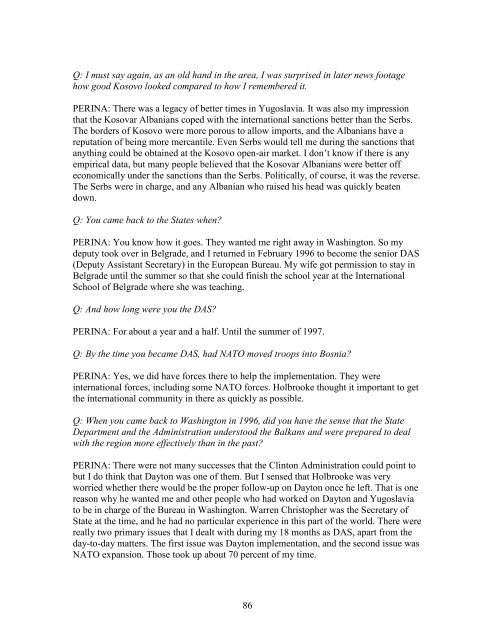ambassador rudolf v. perina - Association for Diplomatic Studies and ...
ambassador rudolf v. perina - Association for Diplomatic Studies and ...
ambassador rudolf v. perina - Association for Diplomatic Studies and ...
You also want an ePaper? Increase the reach of your titles
YUMPU automatically turns print PDFs into web optimized ePapers that Google loves.
Q: I must say again, as an old h<strong>and</strong> in the area, I was surprised in later news footage<br />
how good Kosovo looked compared to how I remembered it.<br />
PERINA: There was a legacy of better times in Yugoslavia. It was also my impression<br />
that the Kosovar Albanians coped with the international sanctions better than the Serbs.<br />
The borders of Kosovo were more porous to allow imports, <strong>and</strong> the Albanians have a<br />
reputation of being more mercantile. Even Serbs would tell me during the sanctions that<br />
anything could be obtained at the Kosovo open-air market. I don’t know if there is any<br />
empirical data, but many people believed that the Kosovar Albanians were better off<br />
economically under the sanctions than the Serbs. Politically, of course, it was the reverse.<br />
The Serbs were in charge, <strong>and</strong> any Albanian who raised his head was quickly beaten<br />
down.<br />
Q: You came back to the States when?<br />
PERINA: You know how it goes. They wanted me right away in Washington. So my<br />
deputy took over in Belgrade, <strong>and</strong> I returned in February 1996 to become the senior DAS<br />
(Deputy Assistant Secretary) in the European Bureau. My wife got permission to stay in<br />
Belgrade until the summer so that she could finish the school year at the International<br />
School of Belgrade where she was teaching.<br />
Q: And how long were you the DAS?<br />
PERINA: For about a year <strong>and</strong> a half. Until the summer of 1997.<br />
Q: By the time you became DAS, had NATO moved troops into Bosnia?<br />
PERINA: Yes, we did have <strong>for</strong>ces there to help the implementation. They were<br />
international <strong>for</strong>ces, including some NATO <strong>for</strong>ces. Holbrooke thought it important to get<br />
the international community in there as quickly as possible.<br />
Q: When you came back to Washington in 1996, did you have the sense that the State<br />
Department <strong>and</strong> the Administration understood the Balkans <strong>and</strong> were prepared to deal<br />
with the region more effectively than in the past?<br />
PERINA: There were not many successes that the Clinton Administration could point to<br />
but I do think that Dayton was one of them. But I sensed that Holbrooke was very<br />
worried whether there would be the proper follow-up on Dayton once he left. That is one<br />
reason why he wanted me <strong>and</strong> other people who had worked on Dayton <strong>and</strong> Yugoslavia<br />
to be in charge of the Bureau in Washington. Warren Christopher was the Secretary of<br />
State at the time, <strong>and</strong> he had no particular experience in this part of the world. There were<br />
really two primary issues that I dealt with during my 18 months as DAS, apart from the<br />
day-to-day matters. The first issue was Dayton implementation, <strong>and</strong> the second issue was<br />
NATO expansion. Those took up about 70 percent of my time.<br />
86
















